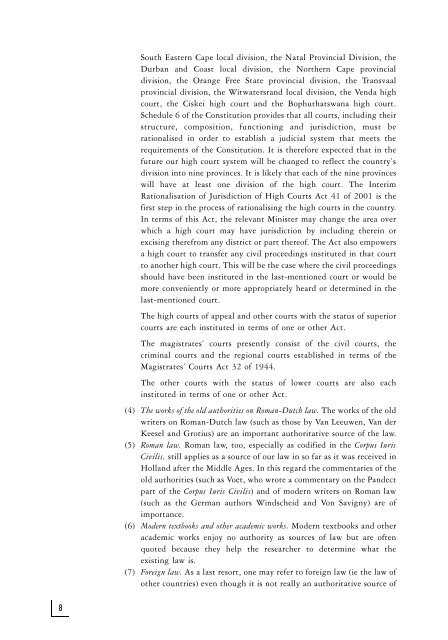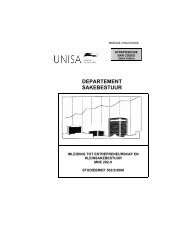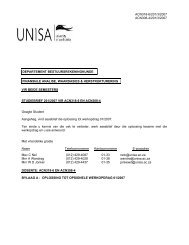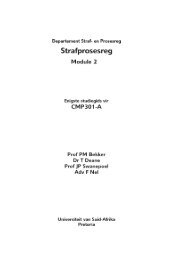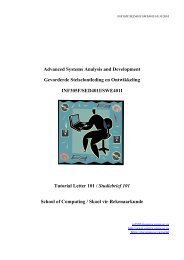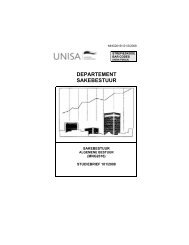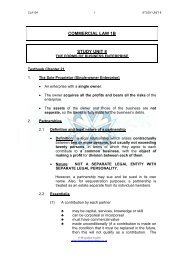key to the study guide - Name
key to the study guide - Name
key to the study guide - Name
You also want an ePaper? Increase the reach of your titles
YUMPU automatically turns print PDFs into web optimized ePapers that Google loves.
8<br />
South Eastern Cape local division, <strong>the</strong> Natal Provincial Division, <strong>the</strong><br />
Durban and Coast local division, <strong>the</strong> Nor<strong>the</strong>rn Cape provincial<br />
division, <strong>the</strong> Orange Free State provincial division, <strong>the</strong> Transvaal<br />
provincial division, <strong>the</strong> Witwatersrand local division, <strong>the</strong> Venda high<br />
court, <strong>the</strong> Ciskei high court and <strong>the</strong> Bophuthatswana high court.<br />
Schedule 6 of <strong>the</strong> Constitution provides that all courts, including <strong>the</strong>ir<br />
structure, composition, functioning and jurisdiction, must be<br />
rationalised in order <strong>to</strong> establish a judicial system that meets <strong>the</strong><br />
requirements of <strong>the</strong> Constitution. It is <strong>the</strong>refore expected that in <strong>the</strong><br />
future our high court system will be changed <strong>to</strong> reflect <strong>the</strong> country's<br />
division in<strong>to</strong> nine provinces. It is likely that each of <strong>the</strong> nine provinces<br />
will have at least one division of <strong>the</strong> high court. The Interim<br />
Rationalisation of Jurisdiction of High Courts Act 41 of 2001 is <strong>the</strong><br />
first step in <strong>the</strong> process of rationalising <strong>the</strong> high courts in <strong>the</strong> country.<br />
In terms of this Act, <strong>the</strong> relevant Minister may change <strong>the</strong> area over<br />
which a high court may have jurisdiction by including <strong>the</strong>rein or<br />
excising <strong>the</strong>refrom any district or part <strong>the</strong>reof. The Act also empowers<br />
a high court <strong>to</strong> transfer any civil proceedings instituted in that court<br />
<strong>to</strong> ano<strong>the</strong>r high court. This will be <strong>the</strong> case where <strong>the</strong> civil proceedings<br />
should have been instituted in <strong>the</strong> last-mentioned court or would be<br />
more conveniently or more appropriately heard or determined in <strong>the</strong><br />
last-mentioned court.<br />
The high courts of appeal and o<strong>the</strong>r courts with <strong>the</strong> status of superior<br />
courts are each instituted in terms of one or o<strong>the</strong>r Act.<br />
The magistrates' courts presently consist of <strong>the</strong> civil courts, <strong>the</strong><br />
criminal courts and <strong>the</strong> regional courts established in terms of <strong>the</strong><br />
Magistrates' Courts Act 32 of 1944.<br />
The o<strong>the</strong>r courts with <strong>the</strong> status of lower courts are also each<br />
instituted in terms of one or o<strong>the</strong>r Act.<br />
(4) The works of <strong>the</strong> old authorities on Roman-Dutch law. The works of <strong>the</strong> old<br />
writers on Roman-Dutch law (such as those by Van Leeuwen, Van der<br />
Keesel and Grotius) are an important authoritative source of <strong>the</strong> law.<br />
(5) Roman law. Roman law, <strong>to</strong>o, especially as codified in <strong>the</strong> Corpus Iuris<br />
Civilis, still applies as a source of our law in so far as it was received in<br />
Holland after <strong>the</strong> Middle Ages. In this regard <strong>the</strong> commentaries of <strong>the</strong><br />
old authorities (such as Voet, who wrote a commentary on <strong>the</strong> Pandect<br />
part of <strong>the</strong> Corpus Iuris Civilis) and of modern writers on Roman law<br />
(such as <strong>the</strong> German authors Windscheid and Von Savigny) are of<br />
importance.<br />
(6) Modern textbooks and o<strong>the</strong>r academic works. Modern textbooks and o<strong>the</strong>r<br />
academic works enjoy no authority as sources of law but are often<br />
quoted because <strong>the</strong>y help <strong>the</strong> researcher <strong>to</strong> determine what <strong>the</strong><br />
existing law is.<br />
(7) Foreign law. As a last resort, one may refer <strong>to</strong> foreign law (ie <strong>the</strong> law of<br />
o<strong>the</strong>r countries) even though it is not really an authoritative source of


